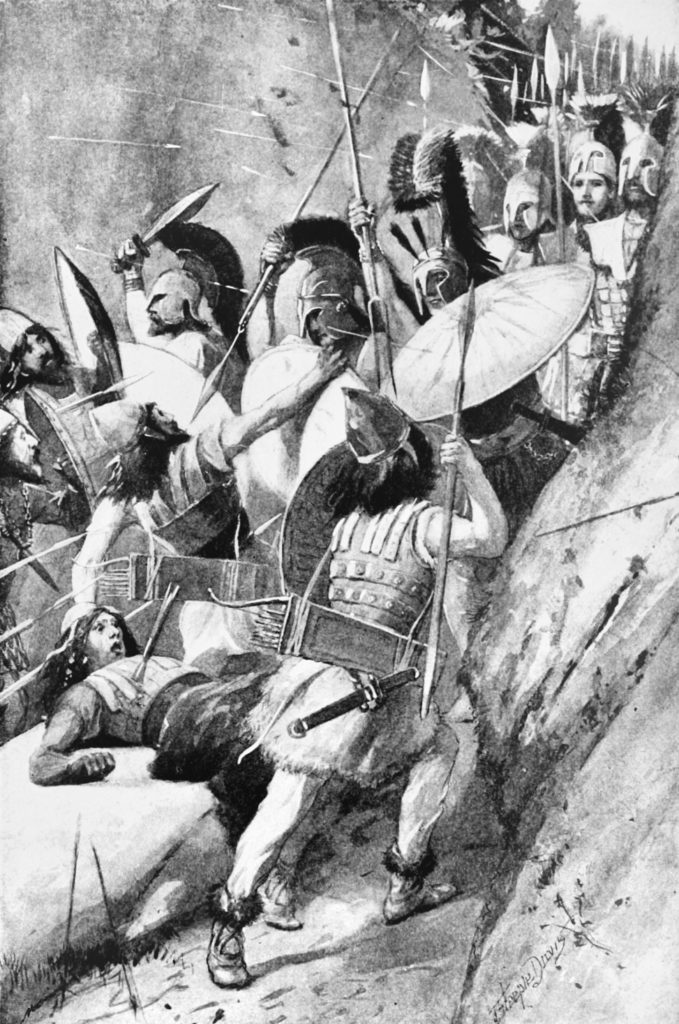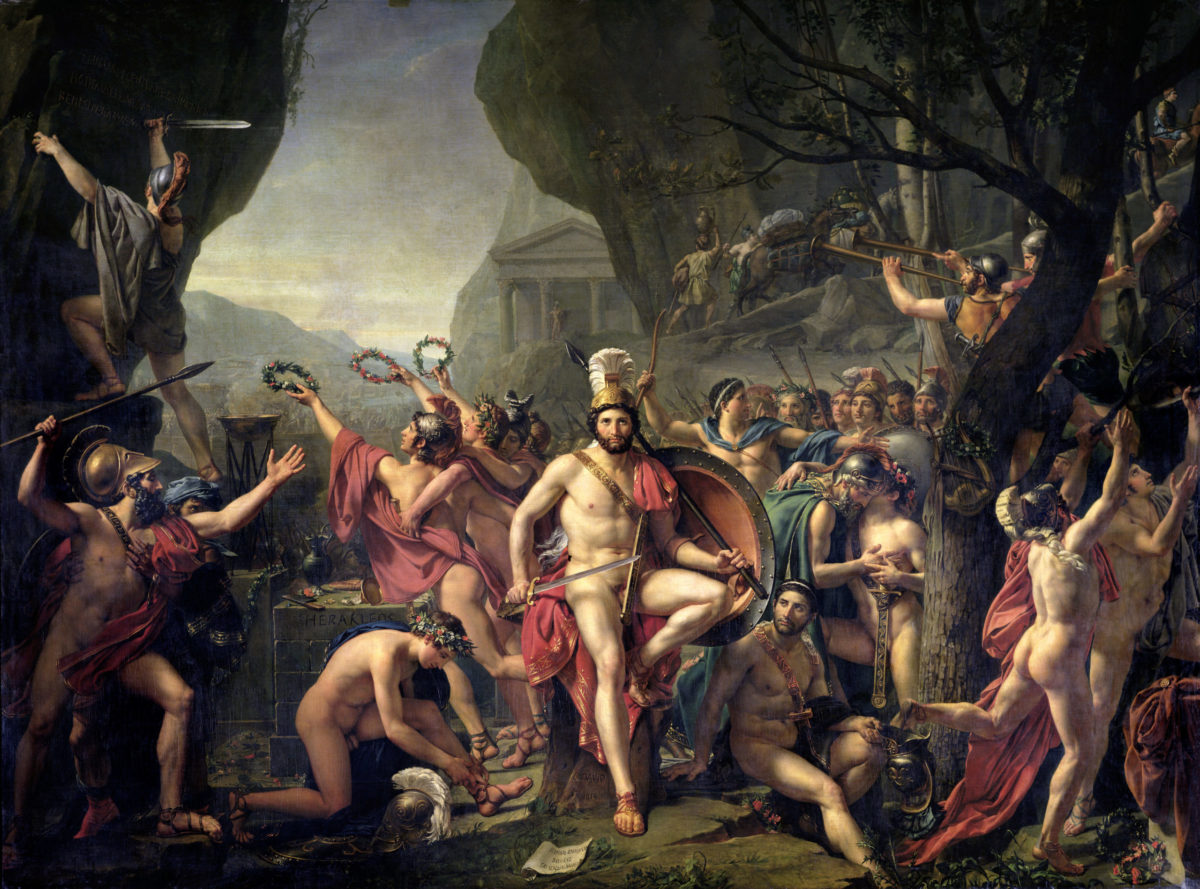The year is 480. Three hundred Spartans, joined by a small force of Greeks, defend the mountain pass of Thermopylae against the invading Persians. If the 300 Spartans had stayed home and if Persians had won the Greco-Persian Wars, the Western concept of freedom most likely would not exist. Authoritarian monarchy would have been the norm, and it would have taken a group of people much like the Spartans to champion again values like protection, free will, and freedom over imperialism, coercion and authoritarianism. Of course, such a defense could have happened, but it might have been harder knowing that the Spartans and other Greeks defending freedom at the battles of Thermopylae, Salamis and Platea had not been able to do it.
Recommended for you
Although the Battle of Thermopylae in 480 B.C. happened about 100 years before the great philosopher and defender of freedom Aristotle was born, the Greeks still had a concept of defending the city-state, the polis. A plethora of poleis existed throughout Greece since about the eighth century B.C. Each city-state zealously guarded its autonomy, desiring the freedom to live according to its own dictates, not another city-state’s, or more importantly, authoritarian regime’s, opinions. While the governments of poleis sometimes differed (Athens had a democracy while Sparta had an oligarchy) and even fought against one another, almost all the Greek city-states did agree in at least one aspect: The Persians were authoritarian, had no concept of freedom, enslaved its people and had to be defeated. Thus, even though Aristotle had not yet described the Greek ideal of freedom, all the city-states defended their independence against enemies foreign and domestic, particularly in the case of the Battle of Thermopylae.

The 300
This great battle in 480 happened during the Greco-Persian Wars, in which King Xerxes of Persia was attempting to gain more territory. A group of Greeks, including Spartans, Athenians and others, banded together to fight against the Persian menace. In order to achieve hegemony over the Greek mainland, Xerxes planned to attack by land and by sea. The loose coalition of Hellenes (ancient Greeks) identified the mountain pass of Thermopylae and the cape of Artemisium as the key defensive land and sea points, respectively, and sent a conglomeration of Greeks headed by King Leonidas of Sparta to protect Thermopylae.
Because the Olympic games were occurring at the same time as the expected Persian invasion, the Greek alliance sent only a small advance guard. Leonidas sent the local contingent to defend Anopaea, a single-file pass near Thermopylae, while the 300 Spartans and others remained on the narrow, yet somewhat larger pass of Thermopylae. The Persian assault began on August 17 and lasted for three days before the Persians finally killed the 298 Spartans who had defended the mountain pass with another small Greek contingent of roughly three to four thousand men. Before the Spartans and others died, however, they had slain twenty thousand Persians.
A defeat that was a victory
While the Battle of Thermopylae was technically a defeat for the Greek coalition, it was also a conquest. It marked the beginning of several important Greek victories against the Persians and represented a morale shift among the Greeks. Even though almost all of the 300 Spartans (two men had defected) had died, they had fought vigorously and valiantly, refusing to merely submit to the Persians. Encouraged by such Spartan actions, the other surviving Greeks fought with greater dynamism against the Persians. Although the Greeks finally beat the Persians in the Battle of Platea in 479 B.C., thus ending the Greco-Persian Wars, many scholars attribute the eventual Greek success over the Persians to the Spartans’ defense at Thermopylae. Had the Spartans and other later Greek armies fled in fear, it is likely that a Persian victory would have promoted imperialism over protection, coercion over free will, and authoritarianism over freedom.
GET HISTORY’S GREATEST TALES—RIGHT IN YOUR INBOX
Subscribe to our HistoryNet Now! newsletter for the best of the past, delivered every Monday and Thursday.
By its very nature, the Persian Empire was expansionistic. Cyrus, Darius, Xerxes, and other Persian kings all wanted to expand the influence of Persia throughout the known world. The Greeks, on the other hand, desired to protect the land they owned against invaders. Until Alexander the Great of Macedonia, they did not yearn for a world empire; the Greeks enjoyed their small poleis and the freedom they had in each one to select a government for the area, such as Athens’ democratic system (although still different from today’s democracies) and Sparta’s oligarchy. If the Persians had been victorious in the Greco-Persian Wars, the Persians might have created the first world empire and required Greek city-states to submit to the Persian monarchy, not allowing the ideas of democracy and freedom to flourish. Although the Persians showed more clemency than other ancient empires like the Assyrians, governors accountable to the king ruled the different regions or satrapies. While the Greeks could have kept their customs and religion, it would have been more challenging to maintain their unique governments, since the Greek satrapies would be required to pay taxes to the Persian Empire. Rather than existing as separate entities, the Greek poleis would have been absorbed by the invasive Persian government.
As a part of this empire, the Persians would have emphasized coercion over free will. As historian Paul Cartledge observes, Herodotus, the ancient Greek historian, recounts how the Persian King Xerxes drove his men into battle with whips while the Greeks fought of their own free will: “[The Spartans] did not have to be whipped to make them fight with all their might …. Whips were only for slaves, not free men; they were appropriate for a barbarian master to use on his slave subjects, but out of the question for the citizen soldiers of a free Greek polis.” If the Persians had won, the king would have whipped the Greeks to make them fight, rather than allowing the Greeks to decide on their own to defend the ideal of freedom. Such an action would have turned the Greeks into barbarians and slaves instead of freemen, thus eliminating the distinction between the Greek poleis and the Persian Empire.
In fact, the Greeks might even change their understanding of key virtues like freedom, since they would be treated like slaves. Instead of learning about freedom, the Greeks would discover authoritarianism where the king’s will trumps the desires of anyone else. In his book Thermopylae, Cartledge references the contrasting language that Herodotus uses to describe the Greeks and Persians: “Since Sparta’s system stood for freedom, it follows that the Great King’s stood for slavery.” If the Persians had won, the Greeks would have grown to accept what they formerly defined as slavery as freedom. The ideals that motivated the Spartans to fight against the Persians at Thermopylae would have died under the Persians.
Americans can thank the Greeks, and especially the Spartans, for things they love and sometimes take for granted, like the Constitution, Chick-fil-a and capitalism. Had the Spartans not stood up, there may not have been enough freedom-loving Greeks left to defend against the Persians. As the renegade Spartan Demaratos tells King Xerxes before the battle in Herodotus’s The Histories, “Now know this: If you subjugate these [Spartan] men and those who have remained behind in Sparta, there is no other race of human beings that will be left to raise their hands against you. For you are now attacking the most noble kingdom of all the Hellenes, and the best of men.”
historynet magazines
Our 9 best-selling history titles feature in-depth storytelling and iconic imagery to engage and inform on the people, the wars, and the events that shaped America and the world.






